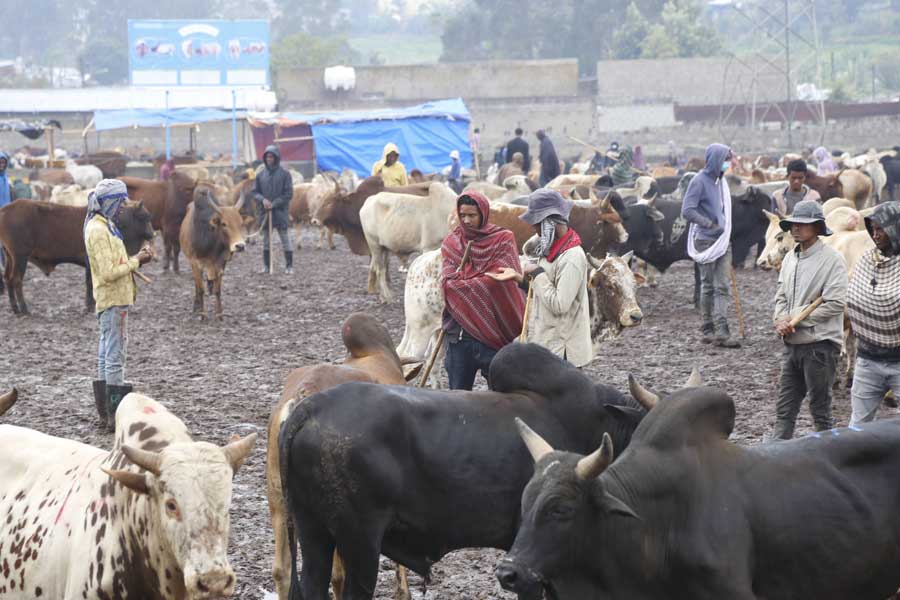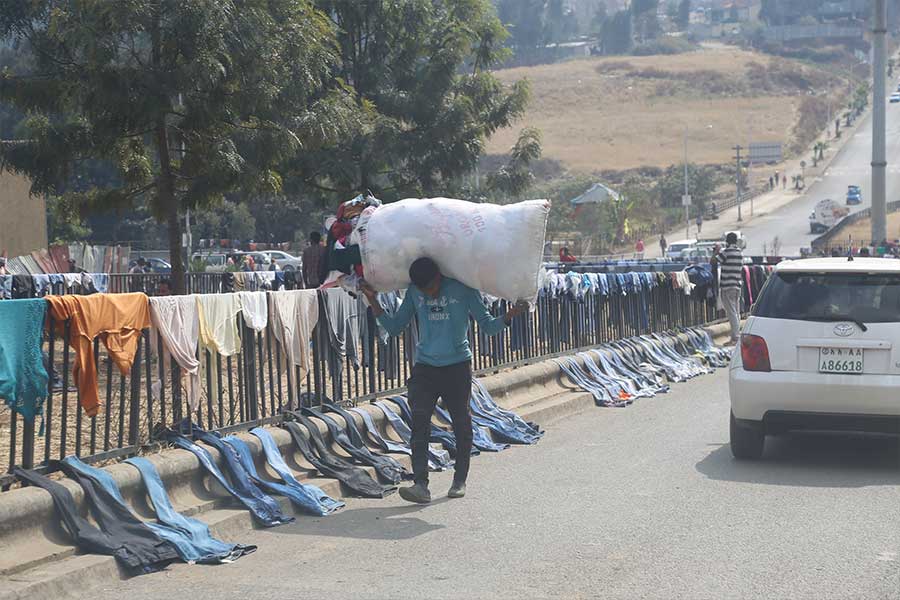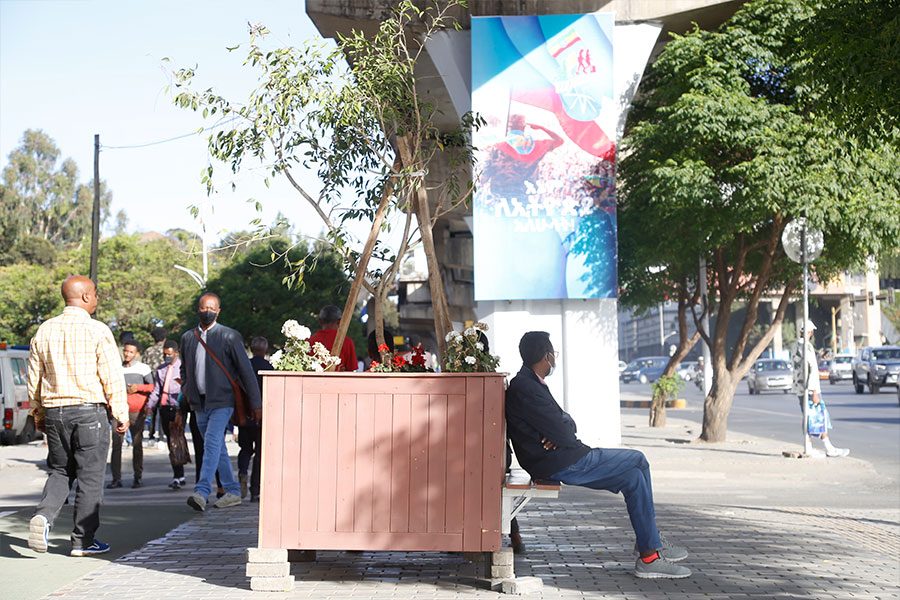
Radar | Aug 17,2025
Desalegn Wondimu joined a shoe retail business close to two decades ago as a retailer. He then opened a shop that sells traditional shoes in Merkato with 1,500 Br in capital six years ago.
In the beginning, he only had eight pairs of men's shoes. Over time, his stock has grown to 150 pairs of shoes at a time.
Business was good at that moment. Especially during holidays the demand for traditional shoes booms, doubling the flow of customers to Desalegn's shop. He sees a spike in sales. Epiphany is the best holiday for his business. Mesqel, the commemoration feast of the finding of the True Cross, follows.
However, over the past six months, the shoe retail business has been depressed. Like many other businesses, the Novel Coronavirus (COVID-19) pandemic has been a heavy enough disruption to paralyse the business.
During Mesqel, Desalegn has an average daily sales income of 3,500 Br, selling at least 10 pairs of shoes. This year, he received only a customer a day.
While celebrating Demera, where the burning of a large bonfire takes place in large gatherings on the eve of Mesqel, people tend to be costumed in traditional attire. Usually, the clothes are made of woven cotton, while the shoes, especially men's, are leather. The feast is held in Mesqel Square, named after the festival, which is currently undergoing a major facelift.
This year's holiday did not see a large, central gathering thanks to the pandemic. The government has banned public gatherings with the aim of curbing the spread of the virus.
The City Administration has restricted the number of attendees to just 5,000, only allowing church choirs and invited guests including government officials to attend the festival. Previously, the celebration, which was recently recorded by UNESCO as an intangible cultural heritage festival, was attended by tens of thousands of people.
"This year there is no demand at all,” Desalegn said.
In addition to random buyers, Desalegn sells his products to grooms or people who receive Communion, a sacrament ritual by the followers of the Christian religion.
Even before the onset of the pandemic, Desalegn has been struggling to stay afloat since his taxes were increased three years ago. He used to pay 400 Br a year, but that amount has jumped to 7,000 Br. His monthly rental fee has also spiked. Four years ago he was paying 400 Br for rent, but it shot up to 22,000 Br last year.
The pandemic has added fuel to the existing problems.
“This is the most depressing season I have ever seen throughout my time in this business,” he said.
Aklilu Gosaye, who retails traditional and modern leather shoes in Merkato, shares Desalegn's experience. During Mesqel, Aklilu used to sell at least five pairs of traditional shoes a week. But during this year’s Mesqel holiday, Aklilu was only selling one pair of traditional leather shoes a week.
Manufacturers of traditional leather shoes are also searching for their usual profits. Fiseha Leather Products Factory, a small-scale leather products manufacturer in the capital that used to sell 60 pairs of shoes on average a day to customers and members of the diaspora, is one of them. The factory now sells less than 12 pairs of traditional leather shoes a day.
"We're seeing very little demand from customers," says Fiseha Demis, the owner of the factory.
Due to slow demand for traditional leather shoes, factories are stopping their production lines. Modern Zege Leather Products Industry, which was established in 1993, has stopped regularly producing traditional leather shoes.
The factory, which produces 1,000 pairs of modern shoes a day, is only manufacturing the traditional shoes when it receives an order from customers, according to Ashagre Bekele, deputy general manager of the company.
The major market seasons when retailers see sales spike are during holidays such as Mesqel and Epiphany, during graduation times in June and July, and the wedding season in January and April.
“Staying in the business is very tough since there are no holiday celebrations, graduations or weddings,” Aklilu said.
Not only the business of traditional shoes but also the sales of casual leather shoes has recessed significantly. The month of September is known for spikes in shoe sales since parents usually buy their kids new shoes for the upcoming school year, according to Desalegn.
“It's almost non-existent now due to the closure of schools,” he said.
The financial effect of the market disruption on these seasonal businesses is devastating since they only wait for a few seasons to sell their products, according to Getie Andualem (PhD), an assistant professor of marketing management at Addis Abeba University.
"Thus, they should diversify their commodities to withstand the demand slowdown," said Getie. "They should have multi-purpose machinery and production facilities."
The demand recession might be attributed to declining purchasing capacity due to the pandemic, physical distancing measures, and the fear people feel right now, according to Getie.
“People usually consume these luxury goods when they feel good,” he says.
These businesses should emphasise innovation and creativity to elevate the demand for their products, according to Getie.
The government should help the leather and textile industries by using e-transaction infrastructure, because they are promising sectors in terms of export, employment and poverty reduction, Getie recommends.
PUBLISHED ON
Sep 27,2020 [ VOL
21 , NO
1065]

Radar | Aug 17,2025

Radar | Mar 30,2019

Radar | Apr 02,2022

Agenda | Apr 30,2021

Fortune News | Oct 18,2025

Radar | Sep 21,2019

In-Picture | Feb 13,2021

Radar | Jun 24,2023

Fortune News | Sep 27,2020

Radar | Jan 07,2022

Dec 22 , 2024 . By TIZITA SHEWAFERAW
Charged with transforming colossal state-owned enterprises into modern and competitiv...

Aug 18 , 2024 . By AKSAH ITALO
Although predictable Yonas Zerihun's job in the ride-hailing service is not immune to...

Jul 28 , 2024 . By TIZITA SHEWAFERAW
Unhabitual, perhaps too many, Samuel Gebreyohannes, 38, used to occasionally enjoy a couple of beers at breakfast. However, he recently swit...

Jul 13 , 2024 . By AKSAH ITALO
Investors who rely on tractors, trucks, and field vehicles for commuting, transporting commodities, and f...

Oct 25 , 2025
The regulatory machinery is on overdrive. In only two years, no fewer than 35 new pro...

Oct 18 , 2025
The political establishment, notably the ruling party and its top brass, has become p...

Oct 11 , 2025
Ladislas Farago, a roving Associated Press (AP) correspondent, arrived in Ethiopia in...

Oct 4 , 2025
Eyob Tekalegn (PhD) had been in the Governor's chair for only weeks when, on Septembe...